
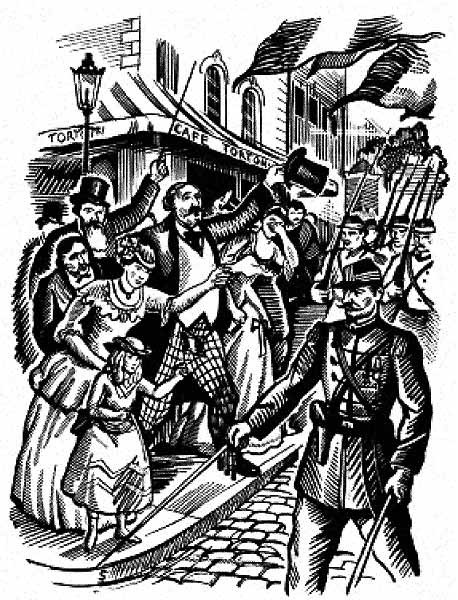
1870年夏天,法国资产阶级将法国拖入与普鲁士的战争。
In the summer of 1870, the French bourgeoisie drew their country into a war with Prussia.

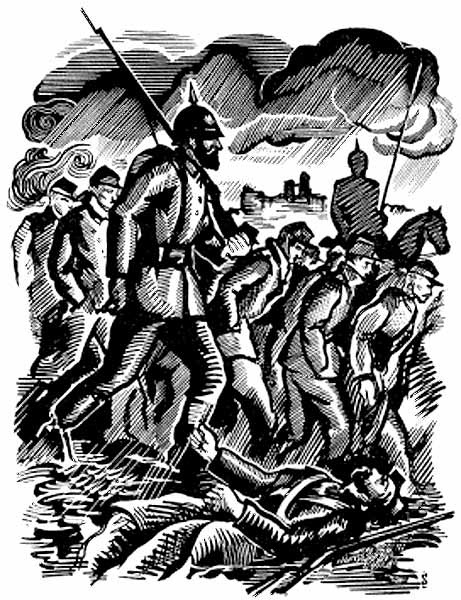
政府和军事头目非常腐败。法国迭遭败绩。
9月,资产阶级政府投入8万名未受军事训练和装备差的法国人,与强大的普鲁士战争机器搏杀。最后,法国被围,被击败。
拿破仑三世以及他的一半军队被俘虏,同样的命运也落到巴黎的防卫部队身上。普鲁士人风卷残云,进军巴黎。
The government and leaders of the army were corrupt. There was a series of defeats.
Finally, in September, 80.000 untrained and ill-equipped men were thrown against the great Prussian war machine. The French were surrounded and defeated.
Napoleon III and nearly half his army were captured, as were the Paris defences; and the Prussians swept on to the capital.

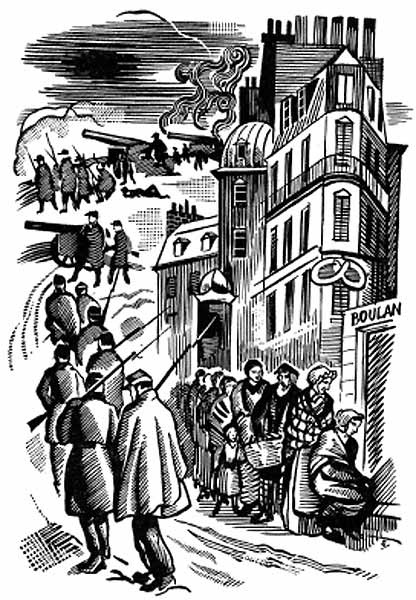
可是巴黎的民众组织起了一支国民卫队。
他们已经感受到了食品的短缺:面包房外,是长长的等待面包的饥饿队伍。
但是巴黎民众得到了一些用于防卫的大炮,并把它们安置在堡垒上。
But the city's masses had organized a National Guard.
They already felt the shortage of food: long lines of the hungry stood about the bakeries waiting for bread.
But they procured a number of cannon for their defence and placed them on the Paris ramparts.

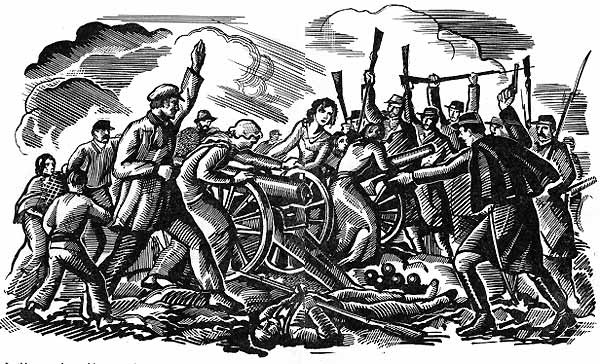
对此,与普鲁士人一样,与城中的富人深感恐惧。
巴黎民众激发了革命热情:如同对付外面的普鲁士敌人一样,他们的枪炮也可以用来对付城内的法国资产阶级,
资产阶级政府试图夺回大炮。当警报响起,全城的工人,包括妇女,跑来保卫他们的防卫设施。政府军对他们不是友好相处,而是攻击。
In this move the wealthy saw a danger to themselves, no less than to the Prussians.
The masses were aroused to a revolutionary fervor: their guns could be swung toward the bourgeoisie within the walls as easily as against the foe without.
An attempt was made to capture the cannon. The alarm was given: the whole city of workers, women as well as men, turned out to their defence. And the Government troops rather fraternized than attacked the defenders

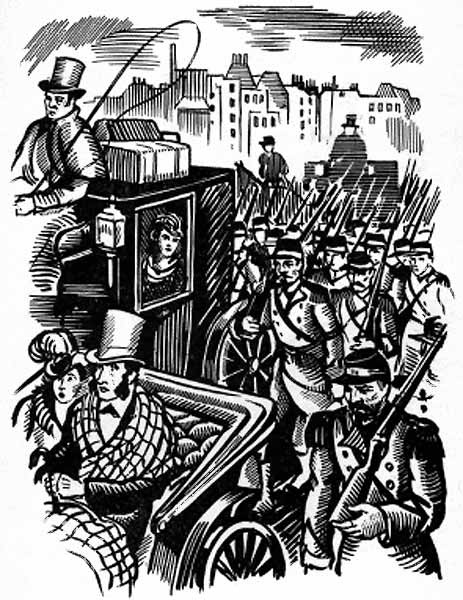
3月18日,巴黎公社宣告诞生。
政府及其军队溃逃到凡尔塞。尽管公社本来可以打败他们,尽管公社本来应该把麇集在巴黎的富人们扣为人质,公社社员允许了这些人的离开。
On March 18 the Commune was proclaimed.
The Government withdrew with its troops to Versailles. The Communards allowed the departure, though the troops could have been won over; and the city's rich who swarmed out of Paris should have been held as hostages.

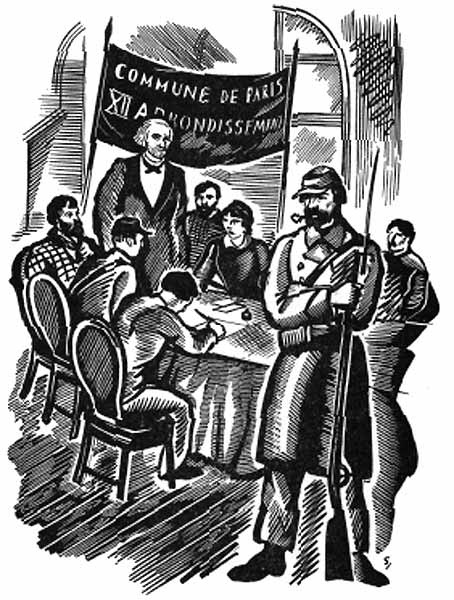
由一些大区组成的巴黎,此时为公社社员所领导:男人和女人、工人和知识分子。按照列宁的说法,正是他们创建了一种新型的国家——工人国家。
The city, organized into arrondissements, or districts, was now headed by groups of Communards -- men and women, workers and intellectuals -- who were, says Lenin,
creating "a new type of state -- the Workers' State."

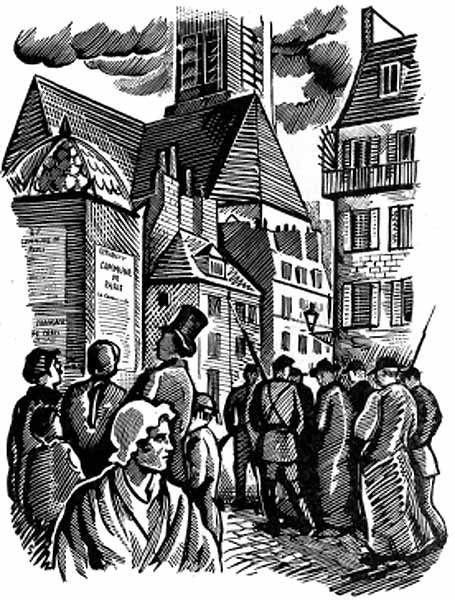
民众涌到街上,阅读新政权的布告:
政教分离;
不允许面包房在晚上加班;
不许调高穷人的房租;
逮捕教士;
重新开放被弃置的工厂;
废除对工人的罚款。
And in the streets the crowds stood to read the proclamations of this new State:
separation of the church;
no more night work in bakeries;
no back rent for the poor;
the arrest of priests;
the re-opening of abandoned factories;
the abolition of fines against workers.

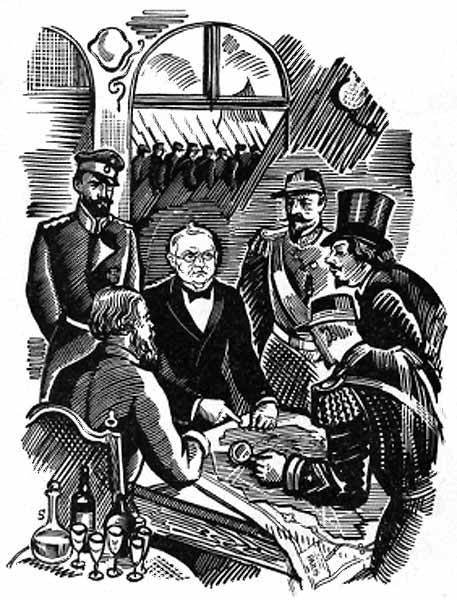
与此同时,在凡尔塞的梯也尔及其反动政府,在普鲁士军官的帮助下,计划对巴黎公社发动攻击。
为着围攻巴黎公社,千千万万被普鲁士军队俘虏的法国士兵被遣送、被武装,送到凡尔塞。公社社员们也在等待着决战的时刻。
In the meantime, in Versailles, Thiers and his reactionary government, aided by Prussian officers, were planning an attack on the Paris Commune.
Thousands of captured French soldiers were to be returned and armed for the onslaught
-- for which, however, the Communards were also preparing.

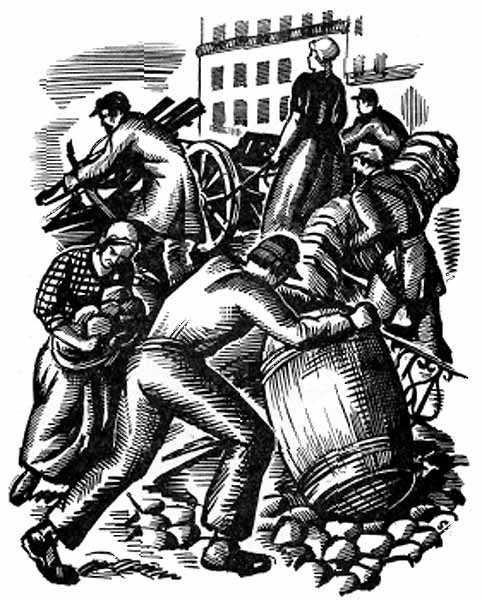
街垒立起来了。男人和女人们参加和指挥了街垒的建设,可是整个城市不可能不被攻陷。城内的资产阶级分子把城市防卫的薄弱环节暗中通报给凡尔塞。从5月22日到5月28日的血腥周里,反动政府军从无人防卫的城门潮水般地涌入巴黎。
勇敢战斗的社员们被驱入巴黎一小块地方的最后一个据点。每一条街道都是战场,每一所房子都是堡垒。
在反动军队无分男女老幼地疯狂屠戮的一次进攻之后,公社社员们筋疲力尽,不得不后撤。
Barricades were erected in the streets. Men and women labored to construct and man them. But the whole city could not be held. The bourgeois who remained in Paris communicated its vulnerable places to Versailles; and from May 22 to May 28, a bloody week, the troops poured through undefended gates.
The Communards, fighting valiantly, were driven to a last stand in one small section of Paris. Every pavement was a battlefield; every house a fort.
The Communards, worn and exhausted, were falling back before an advance that spared neither woman nor child.

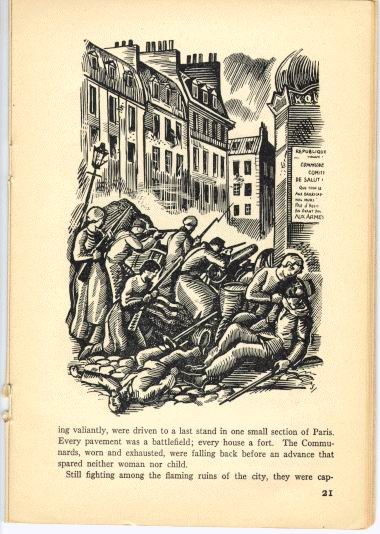
公社战士们在英勇战斗!

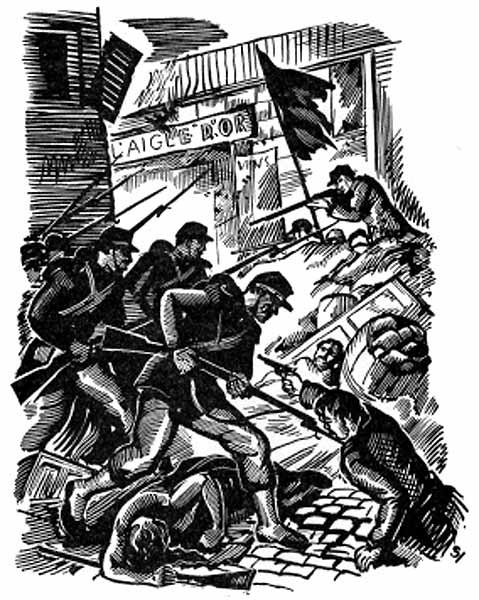
在城市燃烧的废墟中仍然坚持战斗的公社社员们终于被俘。
在他们所在的地方,成千上万的公社社员被枪杀,另外,成千上万的儿童、老人和病人被象牛马一样赶到开阔地枪杀。
每一支疯狂的凡尔塞匪军都是行刑队。被怀疑同情公社的人被集体处决。
巴黎公社被淹没在自己的血泊之中。
Still fighting among the flaming ruins of the city, they were captured.
Thousands were killed where they stood; other thousands -- children, the old and sick --
were herded to open places to be shot.
Each detachment of the maddened Versailles troops was an executioner's gang,
summarily killing every suspected sympathizer.
The Commune was being drowned in its own blood.

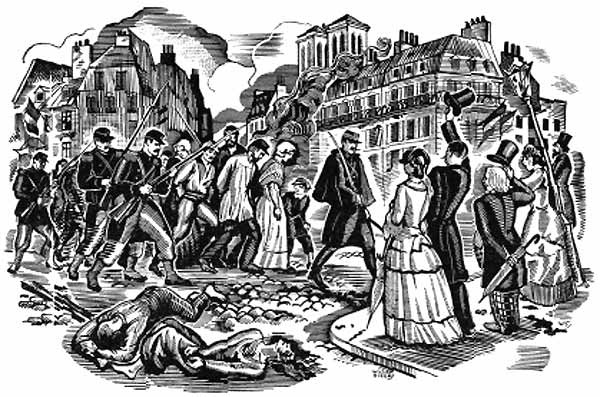
富人们,其中很多从亡命地回来,站在街边观看可怖的示众游行,为他们的胜利弹冠相庆。
And the wealthy, many of whom had now returned, stood on the curbs to watch the ghastly parade and congratulate themselves on their victory.

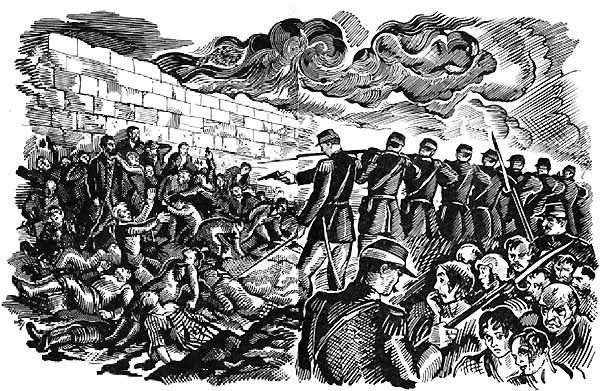
白色恐怖无限蔓延。在拉雪兹公墓以及其他一些地方,成千上万的公社社员被集体处决。
公社的屠夫——Gallifet将军,站在一边观看处决被赶到墙边的不屈民众。
已死的和未死的人被扔在一起,形成许多巨大的“尸山”。
直到今天,巴黎公社社员墙的一部分依然屹立。那些一度雕刻在墙上的、后来被剥落的公社社员们的脸,是对资本主义秩序的挑战,也是巴黎公社烈士的纪念碑。
The White Terror knew no bounds. At Pere Lachaise Cemetery, at a dozen other points, thousands of Communards were herded together and shot.
General Gallifet, the Butcher of the Communards, stood by and watched while the troops fired into the defiant crowds massed against the walls.
Huge mounds were formed of corpses and those not yet dead.
A part of "The Wall of the Communards" still stands; and the sculptured faces that peer from it are at once a challenge to capitalist rule and a monument to the martyrs of the Commune.

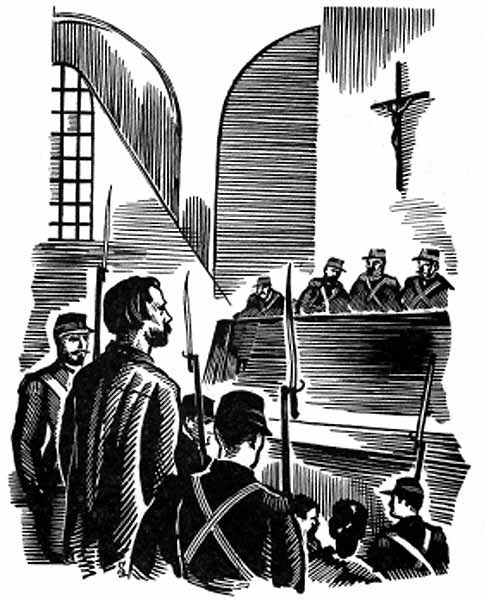
一个星期之内,4万工人被屠杀。
幸存下来的公社社员们被集体模拟审判。在一成不变的单调程式下,他们被宣判有罪,其中有的人被处决,有的人被运到热带殖民地流放。
In that one week 40,000 workers were slaughtered.
Then those Communards who had so far escaped were herded together and given mock trials. With monotonous regularity they were found guilty and executed or shipped to the tropical colonies

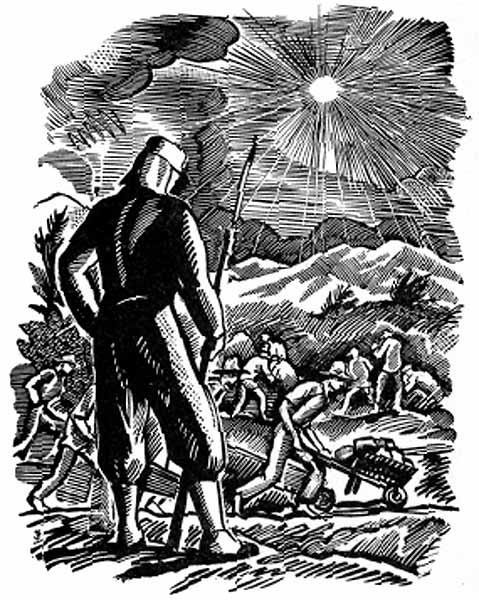
在流放地,他们被迫从事最繁重的劳役。
他们建立过世界上第一个工人政府;作为报复,胜利的资产阶级将其送到流放地,让他们在法国外籍士兵的监管下,死于热病、过劳以及缺医少药。
There they were forced to slave at the most difficult labor.
They had helped found the first government of workers; and in revenge the victorious bourgeoisie sent them to die of fever, overwork and inattention, under the tender ministrations of the French foreign troops

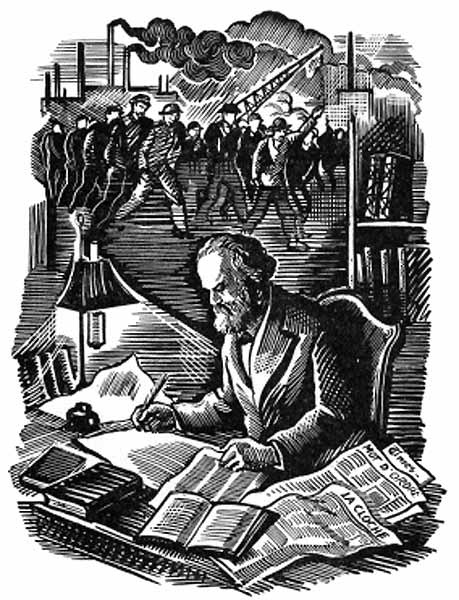
马克思以最大的关爱和理解一直关注着公社的命运。
就在巴黎公社失败后,马克思向世界工人谈到巴黎公社兴衰的经验和教训。“工人的巴黎,”马克思说,“将被视为一个崭新社会的胜利先兆而永远庆祝。”
With the greatest care and understanding Karl Marx had followed the fortunes of the Commune.
Immediately after its fall, he spoke to the workers of the world on the lessons of its rise and fall.
Workingmen's Paris, he said, with its Commune, will forever be celebrated as the glorious harbinger of a new society.

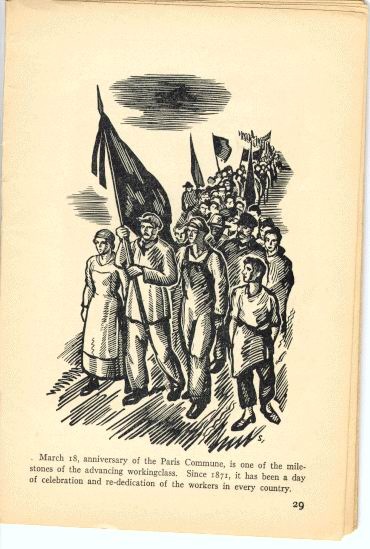
3月18日——巴黎公社的纪念日,是前进中的工人阶级的里程碑之一。1871年以来,在每一个国家里,这一天一直是工人庆祝和为之不懈奋斗的日子。
March 18, anniversary of the Paris Commune, is one of the milestones of the advancing working class. Since 1871, it has been a day of celebration and re-dedication of the workers in every country.

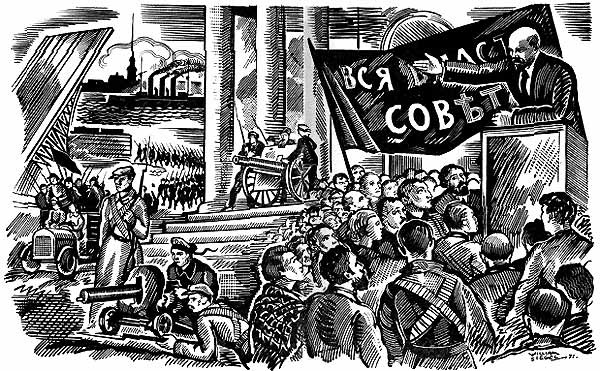
公社重生了!
1917年年10月1日,巴黎公社46年后,在以列宁为首的布尔什维克党的领导下,俄国的工人建立了第一个永远的工人国家。在斯莫尔尼(Smolny)的列宁的指挥下,俄罗斯的公社战士们——各工厂的工人们、涅瓦河中爱芙罗纳舰的水兵们、士兵们——参加了这一无产阶级革命,在“一切权利归苏维埃”的口号下,战胜了资产阶级政府。
“巴黎公社,”列宁说,“迈出了第一步。”苏联的社会主义社会,是工人们向着一个“世界无产阶级公社”前进的开端。
The Commune lives again!
In October, 1917, forty-six years after the Paris Commune, the workers of Russia under the leadership of the Bolshevik Party, with Lenin at its head, established the first workers' state rooted in permanence. These Russian Communards directed from Smolny by Lenin--troops of workers from the factories, the Aurora steaming up the Neva, and the soldiers and sailors who joined the Proletarian Revolution--defeated the bourgeois government under the slogan:
"All Power to the Soviets."
"The Paris Commune," said Lenin, "was the first step." The Socialist Society now being built in the Soviet Union is the beginning of the workers' march to a World Proletarian Commune.
图文来源:国际出版者,国际手册第12号,由约翰.里德俱乐部资助。约翰.里德俱乐部是纽约的一个革命作家与艺术家组织。
1934年第三版《图说巴黎公社》
Source:
http://dwardmac.pitzer.edu/Anarchist_Archives/coldoffthepresses/tracutenberg/pariscommune.htmlFrom: International Publishers, International Pamphlets No. 12,
sponsored by the John Reed Club,
an organization of revolutionary writers and artists in New York.
Third edition, 1934.
The Paris Commune told in pictures
http://www.katardat.org/marxuniv/2002-COMPARIS/comparis-text/comparis-strip.html(Chiapas 译)